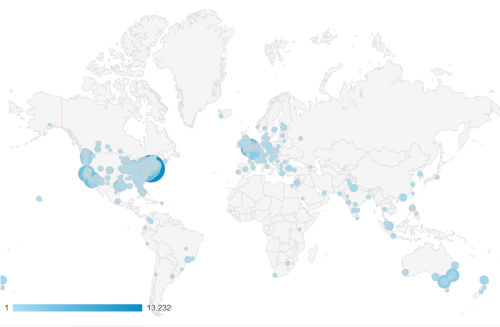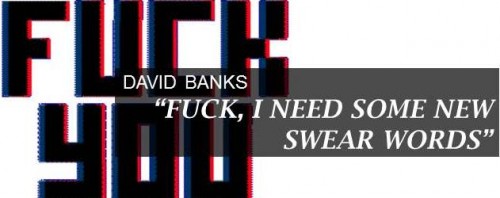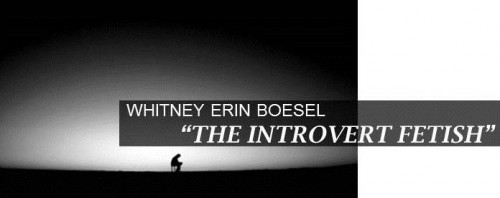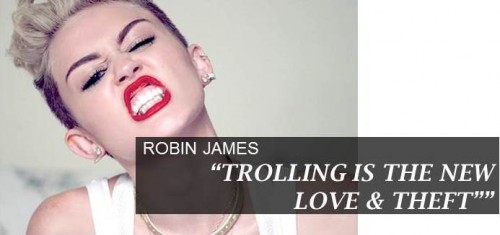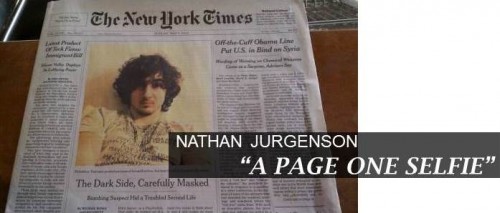Today is Cyborgology’s third birthday (see the first post)! Each year we do a little reflecting. Hear from each author and click the images for some select posts from the past twelve months.
David Banks: It was a great year! The popularity of “Fuck, I Need More Swear Words” caught me off guard but I hope it got a lot more people thinking about the potential for changing everyday speech at this particular historical moment. I also really enjoyed the conversations around “Can We Make an Anti-Racist Reddit” and “Time Traveling in Troy, New York.” I was a little disappointed that my Pumpkin Spice iPhone post sort of fell flat, but I still believe deeply in the design potential of seasonally spiced telecommunications devices. My fellow Cyborgologists also really hit it out of the park this year with Robin’s “Further thoughts on negate social action“, Jenny’s “Social Media Ecology” Whitney’s “The Introvert Fetish“, Sarah’s work with The State’s Murmuration Festival, PJ’s work on Burning Man (1 and 2), and Nathan’s very special message to p-ed writers.
I can’t believe how long I’ve been writing for Cyborgology. I remember how excited I was to see my first post published and how honored I felt to be asked to be a regular contributor. This blog and the community that has formed around it means so much to me and I really cherish all of the amazing conversations I’ve had about the content hosted on the blog. I can’t wait to see what the next year has to bring.
Whitney Erin Boesel: I love Cyborgology‘s “Birthday Retrospective” tradition. After writing as a regular contributor for all of our third year, however, it’s a lot harder to settle on just one favorite post! The most recent one that comes to mind is “The Introvert Fetish“—in part because PBS Idea Channel liked it enough to turn it into a video, and in part because halfway through writing it, I had that rare and wonderful sense of oh wait, this is good. I knew exactly what I wanted to say and, even as i said it, I felt like I was saying it in a solid, streamlined way. Watching that post gain more traction than I’d expected was really rewarding, in ways I still haven’t quite parsed out. Along similar lines, I was thrilled when Quantified Self liked “What is the Quantified Self Now?” enough to repost it on their own blog; I’ve also been both surprised and honored by the number of people who have come up to me at conferences to talk about “What’s In A (User)Name?” (a post which meant a lot to me personally, but which I’d thought was basically sociological navel-gazing). There’s a handful of other posts I want to talk about as well, but what more than half of them have in common is that they’re posts into which I poured some portion of my personal self, and which garnered far more positive feedback than I could have anticipated. As Cyborgology turns three, I remain grateful not only for a platform that has done so much to introduce my work to the world, but also for the community that surrounds that platform—especially my Cyborgology colleagues.
Jenny Davis: Today, on Cyborgology’s third birthday, I’m going to be a bit of a rule breaker. Instead of highlighting a single piece, I want to talk about how The Blog has solidified into a truly professional endeavor for me this year. Blogging is a labor of love. We don’t get paid. It wasn’t counted in my funding evaluations for graduate school. It gives me one line in my CV, buried in the middle, and most likely skipped over as readers beeline for the peer-reviewed publications section and list of courses taught. This year, however, several key events have shifted the meaning of blogging, for me, more solidly into legitimate professionalism. This personal shift, I think, reflects more general shifts in academia which decenter the peer-reviewed-publication and incorporate a wider range of scholarly activities.
First, I cited blog posts—my own and others—in peer-reviewed published pieces. I also saw our work cited in these kinds of venues, and suggested blog posts to authors whose papers I was charged with peer-reviewing. Importantly, as I’ve seen and partaken in these developments, I have yet to encounter and editor who batted an eye. My own work, and those of the Cyborgologist team, are beginning to meld with the more traditional, and more legitimized forms of scholarship. I wrote about this here. Second, I was invited to write a book chapter about my experience as a woman blogger. I used the theory of identity prosumption—a theoretical perspective many of us utilize and explore in our blog posts—to frame my narrative. Again, the editors of the book were highly supportive. Finally, I got a job. Like, a real job. In Sociology. Doing social media research. AND my department is excited and supportive of my blogging. They don’t see it as something extraneous, but as legitimate professional activity. It is even built into my “review” criteria under the heading of “service.” Personally, I think it also overlaps strongly with scholarship (see first paragraph especially) but any placement of blogging into tenure review requirements is a big step in the right direction.
Happy Birthday, Cyborgology!! Can’t wait to see where we go in the years ahead.
Robin James: I was really excited to join the cyborgology crew this past summer. Since then, I’ve written a lot about music, sound, and noise. Here, for example, I used Miley Cyrus’s VMA performance as a way to think about how social media affects practices of cultural appropriation. “The post-authentic quantified self,” I argued, “appropriates femininity and blackness through trolling.” I’m currently thinking about how the music business has shifted from selling records to generating social media buzz, YouTube plays, etc.
Nathan Jurgenson: Three calendar laps in and Cyborgology has grown from blog to community, from disparate ideas to, dare I say it, the beginnings of a perspective. With all the baggage that term carries, Cyborgology started on and has developed a stance towards technology always oriented towards embodiment, critique, and social justice. Not long after the blog first started, I came up with the phrase “digital dualism”, a topic that has Cyborgology as its original home and continues to be where the contours of that relationship between the screen and its contents is most deeply theorized. In the past year, I’ve written much about digital dualism on this blog: 1, carving out three approaches to digital dualism theory; 2, two type of digital dualism and augmented reality; 3, responding to critiques from the left (Tyler Bickford) and the right (Nicholas Carr); 4, critiquing popular digital dualism when I see it in the New York Times or a viral video, prompting a little snarky satire. I also wrote about privacy and publicity, how our approach is so often victim-blame-y from how we teach teens about privacy to how we talk about the NSA, to my issue with people claiming how glad they are they didn’t have social media when they were young. The post I’d like to highlight here was my reflection on the New York times choosing an Instagrammed selfie for its front-page story on the Boston bomber, Dzhokhar Tsarnaev.
PJ Rey: It’s extraordinary to think that, little more than three years ago, Nathan and I were seated in Washington, DC bar discussing what we should name the blog that we had spent a few weeks sketching out and building. Our hope was both to create an intellectual home for ourselves and to engage broader publics on issues surrounding the digital technologies that now pervade our lives–particularly, big sociological questions and social justice issues that are seldom covered in the business-heavy tech sections of national newspapers. And, just as important, we desperately wanted to find other folks interested in collaborating and conversing with us on these topic. We’ve been extraordinarily fortunate to have David, Whitney, Jenny, Robin, and Sarah join us in building Cyborgology into a vibrant intellectual community. Together, we’ve built the site into a daily source of fun and smart analysis of a wide range of issues linking tech and society.
On a personal note, the past year was marked by some really fruitful collaborations with Whitney (post, post, and paper) on embodiment, subjectivity, and augmented reality. I’ve also tried to address some big issues (economic justice and consent) in my own Burner / Burning Man community. The post I’m most excited about, however, received somewhat less attention. In “Materiality Matters: Confronting Digital Dualism with a Theory of Co-Affordances,” I tied together a couple issues I had been thinking about for a long while: 1.) that the affordance of various objects are coimplicated in one another, and 2.) we can use the concept of affordances to talk about how digital and analog media are inescapably intertwined in our experience, even if, objectively, they have very different properties. I see this understanding as the basis for a phenomenological approach to debunking digital dualism.
Sarah Wanenchak: If my previous year at Cyborgology was about convincing myself that I could actually pull off saying something at least semi-interesting on a weekly basis (and I’m still not sure sometimes), this year has been about experimentation – with my own writing, with what I feel like I can appropriately do for the blog, with the intellectual places in which I want to venture. I wrote a lot about stories, I fell in love with drones, and I touched a good bit on fandom and video games, both subjects near and dear to my heart. But if I did one thing that I’m especially proud of this past year, it’s that I found the courage to be confessional. I made a lot of my writing painfully personal, and I think the results were generally good. I often did this in ways that blurred the line between my academic writing and my fiction, which has been endlessly rewarding. So although it’s difficult to pick a single one, I think the post I’m most proud of is “Thirteen Ways of Looking at Livejournal”, a sprawling and chaotic and deeply weird little essay that dealt with my memories of identity formation online as a teenager and my difficulties in negotiating identities in the present. I was very scared of writing it, and the process itself was filled with that kind of slightly crazed euphoria that comes with attempting anything frightening and not completely failing.
Being able to experiment and to play off ourselves and each other is one of my favorite things about this blog and this community of writers. I think I’ve grown a lot in a year; I think we all have. I can’t wait to see where we go next.
***
The most commented on posts written between October 2011 and 2012:
1. Dude-ly Digital Dualism Debates
2. Strong and Mild Digital Dualism
3. Rape Culture, Consent, and “Grabbing 100+ Boobs at Burning Man 2013″
5. Responding to Carr’s Digital Dualism
6. Status Flight and the Gendering of Google Glass
7. “Smart Parking” and the Robert Moses Mistake
8. IS THE INTERNET MAKING OP-ED WRITERS LAZY?
9. Fuck, I Need Some New Swear Words
10. “Glad I Didn’t Have Facebook In High School!”
The most commented on posts of All Time:
1. Digital Dualism versus Augmented Reality
2. The Faux-Vintage Photo: Full Essay (Parts I, II and III)
3. Dude-ly Digital Dualism Debates
4. The Rise of the Internet (Anti)-Intellectual?
5. Race, Class, App.net: The Beginning of ‘White Flight’ from Facebook & Twitter?
6. Strong and Mild Digital Dualism
8. Rape Culture, Consent, and “Grabbing 100+ Boobs at Burning Man 2013″
9. Sherry Turkle’s Chronic Digital Dualism Problem
